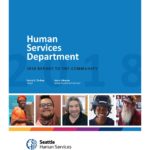HSD Releases 2018 Annual Report
2018 was a remarkable year! We elected a new mayor, prepared for changes in the HSD directorship with the departure of Catherine Lester, and experienced growth in our budget and staff as well as changes to some long-standing programs. Instead of letting it slow us down, we focused on the work and our department’s core values of racial equity, results, stewardship, innovation, and our collective experience as employees. Together, we saw many successes. You’ll see this work and its impact described in our just-released 2018 Annual Report.

